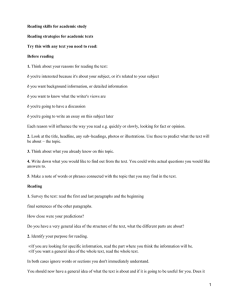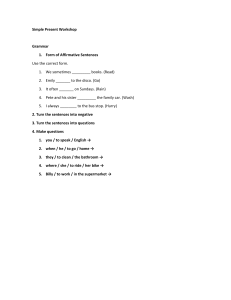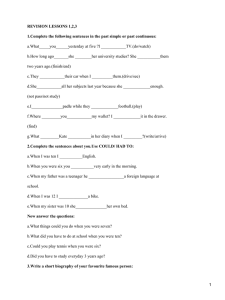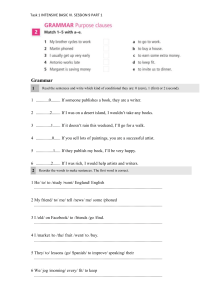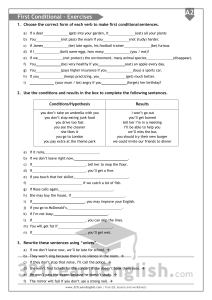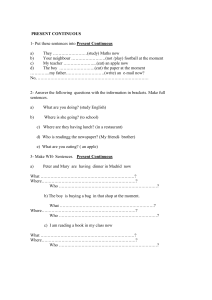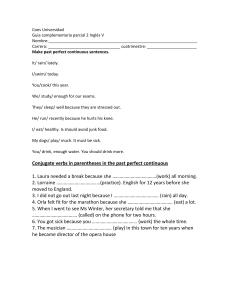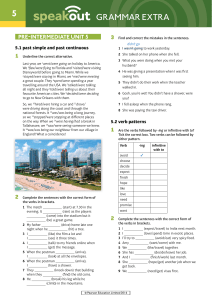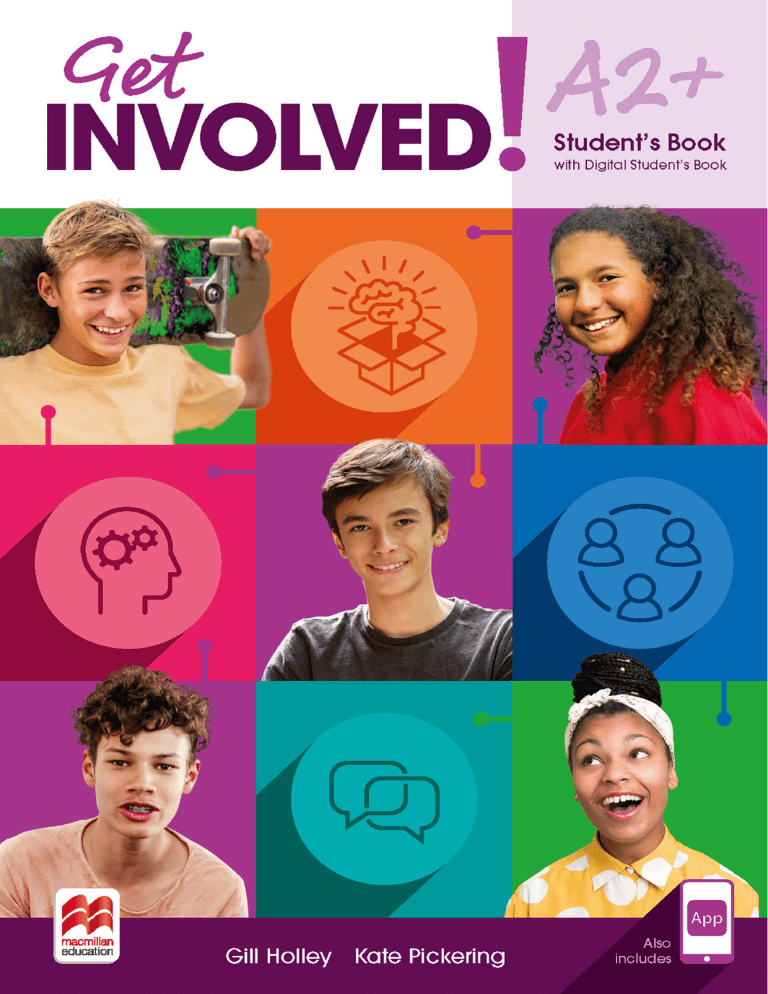
Vocabulary 3 WDYT? (What do you think?) 5 Goals 3 3 Learning a new language 8 -9am: gym Learn the complete expression including the verb. It will make it easier for you to use new language. 5 Copy and complete the table with achievements from exercises 2 and 3. Give reasons for your answers. 2 What is your idea of success? Vocabulary: success and achievements; word families: verbs and nouns 7-10am: cycling 1 d pain = brea œuf = egg Grammar: past continuous; past simple and past continuous; when and while 6 - 8 am: running 6 Achievement Reasons Important get good grades study what you want make your parents happy Not important be rich money doesn’t make you happy Work in pairs. Compare your opinions in exercise 5 with your partner. Do you think it's important to be rich? Reading: an online article about three famous brands pomme = appl e fraise = straw be Listening: about the Afghan girls’ robotics team No because I think that money doesn't make you happy. What do you think? 6 rry VIDEO SKILLS 4 Speaking: telling a story Writing: a story Project: make an infographic about a success story chicken poulet = fish poisson = WANTE Paper b D oy / girl To deliv newspa er pe Monday rs to Friday £20 pe r week citron = lem on beurre = bu tter VIDEO SKILLS Video skills p37 Success and achievements 1 2 3 36 Match the phrases in the box to pictures 1–6 on the noticeboard. be famous feel happy get fit learn a language make money win a race Real-world speaking p43 Project pp46–47 Work in pairs. Look at the noticeboard from Liam’s bedroom. What can you say about Liam’s hobbies and interests? Complete the expressions with the verbs in exercise 2 to describe other types of achievement. 1 (…) a prize/a competition 4 (…) popular/rich 2 (…) a good job/good grades 5 (…) friends/a difference 3 (…) something new/to surf 6 (…) part of a team/proud 4 Complete the sentences with an expression from exercise 3. 7 Watch the video. What is the vlogger's main goal? Is she successful? 8 Work in pairs. Discuss the questions. 1 I like water sports, so I’d love to (…) . 2 My friend was really pleased to (…) in this year’s writing competition. 3 My dad says it isn’t so important to (…) in all your exams. What’s important is working hard and doing your best. 1 Why do people make ‘how to’ videos? 2 Why are ‘how to’ videos popular? 4 I’m not very good at running, so I (…) that I finished a 10k race last weekend. 3 Why is watching a ‘how to’ video a good way to learn something new? 5 Money isn’t very important to me. I think it’s more important to be happy than to (…) . 4 What could you make a ‘how to’ video about? 6 My brother is studying to be a doctor because he wants to (…) . Pronunciation: Word linking p116 37 3 An online article 1 Write the missing verbs for each group of expressions. Then choose five expressions that may be reasons to work for a successful company. 1 (…) a race, a prize, a competition 2 (…) money, friends, a difference 3 (…) fit, a good job, good grades 4 (…) famous, popular, rich 5 (…) a language, something new, to surf 6 (…) part of a team, happy, proud 2 3 Reading and critical thinking Work in pairs. Look at the photos and discuss the questions. 6 Word work Match the words in bold in the text with an expression which means the same. Then answer any additional questions. 1 was in the shops for people to buy (What’s the infinitive?) 2 give financial help 3 green, helping the planet 4 people who start an organisation (What’s the singular noun?) 5 from the recent past 6 took data from the Internet onto a computer or smartphone (What’s the infinitive?) TIMELINE 1943 1948 7 Complete the sentences with the correct word or phrase from exercise 6. 1 I prefer cycling to going by car, because it’s more (…) . 2 People used to queue for hours when a new Harry Potter book (…) . 3 1 How many brands can you name for each of the products in the photos? 3 My aunt loves fashion from the 1970s: she’s really into (…) clothes. 2 Do you have a favourite or least favourite brand for these products? Explain your reasons. 4 Larry Page and Sergey Brin were the (…) of Google. Read and listen to the online article about three brands and answer the questions. 15 For which brand was the key to success … 1 making new products and doing new things? 2 old things coming back in fashion? 3 making things easy for users? 4 Read the text again. Match the dates on the timeline with information from the text. 1943: Edwin Land first had the idea of instant photography. 5 I (…) that new game yesterday – it’s amazing! 6 A lot of big companies (…) sports teams. 5 Complete the sentences with information from the text, using a word or phrase. 1960s and 70s CRITICAL THINKING 1 Understand Which of the three brands in the text do you think had the most difficulty, and why? 2 Apply Can you think of other difficulties businesses can have? Give some examples. 3 Evaluate Why do people like buying famous brands? Are brands (of clothes, shoes, phones, etc.) important to you? Why/Why not? Subskill: Finding answers in a text Sometimes the words in a question are different from the reading text. Look for words or phrases with a similar meaning. 1966 1980s 2010 Research Vans holds a competition every year for high-school students to design Vans shoes. Find this year’s winning designs in the Van’s Custom Culture Art competition. What do you think of the designs? Which is your favourite? 2012 1 The name of the app that came before Instagram was … 2 25,000 people downloaded Instagram in one … 3 At first most of the people who wore Vans shoes were … 4 Apart from making shoes, the Vans company organises … 5 A big problem for Polaroid cameras was … NOW How it all started: the story of three brands I nstagram founders Kevin Systrom and Mike Krieger originally launched their app as Burbn. When it proved too complicated for many users, they decided to make the app much simpler: take a nice photo, share it with your friends, comment on other people’s photos. It was an instant success: on 6th October 2010, 25,000 people downloaded it in 24 hours. Instagram became popular really fast, but the team was very small. Just 13 people were working for Instagram when Mark Zuckerberg bought the company in 2012 for 1 billion dollars. Systrom and Krieger made a lot of money and both men are very rich today. T he Van Doren brothers started the Vans company in 1966 and their shoes were soon very popular with skateboarders. Before long, people were wearing Vans as a fashion shoe as well as for sport. The company had some financial problems in the 1980s, but soon it was doing much better. Now they make boots for snowboarders, sponsor sports competitions and organise an annual art competition for high-school students. It’s a company that also tries to make a difference, with environmentally friendly offices and community projects. E dwin Land first had the idea of instant photography when he was travelling with his daughter in 1943, and the first Polaroid Land camera went on sale in 1948. They became really popular in the 1960s and 70s. But when people started to use digital cameras, the Polaroid company had a very hard time: people weren’t taking photos in the same way. Today it’s a different story. Retro things are popular again and today people are buying instant cameras to use at weddings and parties. 6 Today some people buy instant cameras for … 38 The longer read Resource centre 39 3 Grammar Vocabulary and Listening Past continuous 5 Write questions in the past continuous. 1 (boy / walk) quickly or slowly at the start? 1 Read the examples. Copy and complete the 2 (what / boy / do) while (he / walk) ? table with the words wearing, were/weren't and was/wasn’t to make the past continuous. In 2012, just 13 people were working for Instagram. The company was doing very well. At the start of the 21st century, people weren’t taking photos in the same way. Affirmative/negative subject be +(not) I, he, she, it 1 (…) / (…) you, we, they 2 (…) / (…) verb -ing Word families: verbs and nouns 5 1 Read the board. Which presentation topic would you choose? Why? 3 (what / birds / do) ? 6 Work in pairs. Complete the sentence with a noun or the correct form of the verb in brackets. Then ask and answer the questions. 4 (any other people / travel) ? 1 Where do you look for (…) (inform) when you do your homework? 5 (how / boy / move) in the second part? 2 What’s your favourite sports (…) (compete) ? 6 (who / boy / talk to) ? Presentation homework Listen to a sequence of sounds and answer the questions in exercise 5. Prepare a three-minute presentation on one of the following topics: 4 What is your favourite (…) (advertise) on television? • a time you decided to compete for a prize 5 When was the last time someone (…) (invite) you to a party? 16 7 Answer the question to solve the Brain teaser. B R I A N 3 Do you think that technology (…) (improve) our lives? How? • a story of an amazing achievement 3 (…) -ing form 3 • a person you would invite to speak at your school and why TEASER • an invention that changed the world Check the Spelling rules on p21. A presentation 6 Be ready to give your presentation next week. 2 Complete the sentences with the affirmative or Listen to a student giving a presentation. Which topic in exercise 1 does she talk about? 17 negative form of the past continuous and the verbs in brackets. 1 At 6:30 am today I (…) (sleep) (+). 2 Last night at 10:30 pm my dad (…) (make dinner) (-). 3 One hour ago we (…) (do sport) (+). 4 This time last week, we (…) (study) (-) English. 5 Two minutes ago our teacher (…) (write) (+) on the board. 3 Work in pairs. Write true sentences starting with the time phrases in exercise 2. Compare your sentences with your partner. At 6:30 am today I was having breakfast. 4 Read the examples and add them to the tables below. remember? Each suspect was carrying one thing and wearing one of the items of clothing. Wh- questions question be word subject verb -ing Where they were • Mark wasn’t carrying a camera or a beach bag. 2 invent b -ment • The person who was carrying a camera was wearing a scarf. 3 competi c -ation 4 invit d -tion Were Yes, they were. Clara beach bag scarf Yes/No, subject be (+ not) Mark camera sunglasses wearing hat sunglasses? 3 Match 1–4 to a–d to make nouns. a -ion Yes/No questions be subject verb -ing they 2 What are the two endings for the nouns? 1 achieve backpack yesterday? 1 Which are verbs, and which are nouns? • Clara was wearing sunglasses. Jana going 2 Look at the words in bold in exercise 1. The police know that the bank robber was wearing a hat. • Mark and Clara weren’t wearing a scarf. Was the Vans company having problems in the 1970s? No, it wasn’t. Who was Edwin Land travelling with in 1943? 40 7 What problems did the girls have? Can you ✓ ✗ ✗ Can you find the identity of the bank robber? 4 Subskill: Writing notes When you answer questions, make notes first using key words to help you remember. If necessary, write complete sentences after you finish listening. 8 Listen again and answer the questions. Write notes first. 1 How old are the girls? 2 What happened when they tried to get materials for their robot? Copy and complete the table with the corresponding verb or noun. Verb Noun compete 1 (…) 2 (…) invitation 3 (…) improvement inform 4 (…) educate 5 (…) 6 (…) agreement 7 (…) advertisement 3 How long did they have to make their robot? 4 How many times did they travel to Kabul to get visas? 5 How did they get visas in the end? 6 What did the girls do when their robot broke? 7 What did the girls win? 9 Work in pairs. What do you think about the end of the story? What do you think was the girls’ greatest achievement? 41 3 Grammar Past simple and past continuous Real-world speaking 5 Write questions. In each question, use both the past simple and past continuous. 1 where / your parents / live / when / they / meet ? 1 Read the examples and answer the questions. While the girls were waiting, they tried to invent a robot. They were practising with their robot when it broke. 1 How many actions are there in each sentence: one or two? 2 Which action is a long action? Which is a short action? 3 Which tense do we use for the long action? Which do we use for the short action? 2 Choose the correct option. 1 I went/was going to a robotics competition while I stayed/was staying in the USA. 2 We walked/were walking home from school, when it started/was starting to rain. 3 While I visited/was visiting my cousin, I learnt/was learning to surf. 4 When the bus came/was coming, I talked/ was talking on the phone. 5 We watched/were watching when our team won/was winning the Cup. when and while 3 Read the examples and choose the correct option in the rules. They were practising with their robot when it broke. While they were practising with their robot, it broke. 1 We often use while/when before the past continuous. 2 We often use when/while before the past simple. 4 Complete the sentences with the past simple or past continuous. 1 The sun (…) (shine) when I (…) (wake up) today. 2 I (…) (call) my friend while I (…) (wait) for the bus to arrive. 3 We (…) (chat) when our teacher (…) (come) into class today. 4 My parents (…) (meet) while they (…) (work) in a shop. 5 My dad (…) (make) dinner when I (…) (get) home yesterday. 42 3 2 what / they / do / when / you / get / home yesterday ? 3 Who / you / talk to / while / you / come / to school ? 4 What / you / do / while / you / wait / for the bus ? 6 Work in pairs. Ask and answer the questions in exercise 5. 7 Work in pairs. How many crazy sentences can you make using the prompts? I eat an icecream We see a spaceship Our teacher sing in the shower [famous person] step on a snake run to catch the bus find a million while euros when meet [famous person] have breakfast 8 Choose the correct option. Telling a story 1 Work in pairs. Which famous person would you most like to meet? 2 story. Follow the steps in the Skills boost. Watch the video. Which famous person did Diego see and where? Watch again and check. PREPARE Jen Prepare your dialogue. Remember to use the Key phrases. Diego PRACTISE I know. Did I ever 1 (…) the time I saw Tom Holland? Jen You’re 2 (…) ! Selena Gomez growing up Selena Gomez is rich and famous, but her life 1 was/were very different in the past. She used to 2 live/living with her mother in a small apartment in Los Angeles. They 3 weren’t having/didn’t have much money and they couldn’t 4 buy/to buy nice things. Selena’s mother worked as an actress. That’s how she 5 become/became interested in acting. Selena got her first job when she was nine. A few years later, she got a part in a Disney show. Selena 6 worked/was working on this show when she 7 met/was meeting Justin Bieber! Now she acts and sings, and she also does a lot of work for charity. A few years 8 before/ago, Selena was ill, so now she eats a healthy diet and does exercise at least 9 twice a week/two times in a week. She has millions of followers on Instagram. She’s one of the most popular people in the world! Work in pairs. Make notes about a time you saw a famous person. 1 Where were you? What were you doing? 2 What was (the famous person) doing? 3 What did you do? What did he/she say or do? 4 Complete the dialogue with the Key phrases. Great movie! The way he climbs and jumps – it’s awesome! Practise your dialogue. Take turns to tell your story. Diego PERFORM It’s true. I was staying with my cousin in London at the time. Jen So, 3 (…) ? Diego Well, we were walking in the park one day when we saw people playing sports. Jen Right. Diego They were free running, you know, doing acrobatics. Jen And one of them was Tom Holland? Diego Yeah, 4 (…) he was training at the park. Jen 5 (…) ! Did you say anything to him? Diego No, we just watched for a while. He was really good! Jen I can’t believe you actually saw Spider-Man! SKILLS BOOST THINK 3 Watch again. Which Key phrases do you hear? GRAMMAR ROUND-UP 1 2 3 4 5 6 7 8 5 Create your own dialogue. You can invent the Act out your dialogue for the class. 6 Peer review Listen to your classmates. Answer the questions. 1 Who did they meet or see? What happened? 2 Which Key phrases did they use? Key phrases Starting a story: Did I ever tell you about the time … It all started when … Keeping the listener interested: Can you imagine? You’ll never guess what happened. It turns out … Responding: You’re kidding! So, what happened? That’s awesome/incredible/amazing/terrible! What a nightmare! US UK Great movie! (US) Great film! (UK) We saw people playing sports. (US) We saw people doing sport. (UK) Phrasebook p123 43 3 5 Write a story for the school magazine. Follow One day, Billy Reid was walking along the beach near his home in Florida when he saw $100 in the sand. The 14-year-old picked up the money. Then he saw another $100, and another. Soon, he had $1,500 in his hands. the steps in the Skills boost. 17-year-old Miles Solomon does a physics project – he has a surprise he checks data from the International Space Station – he finds a mistake Billy, a golf fan, was with friends from a local golf organisation when he found the money. They couldn’t believe it when he showed it to them. Billy didn’t think twice. When he saw a police officer, he gave him the money. he checks the data again and again – he is sure Billy’s story was in all the newspapers and on television. A few days later, he received a phone call. It was an invitation to play video golf with some professional golf players. Billy was really happy. He played with some of his favourite players – and won! In the end, he didn’t get any money, but he got a wonderful surprise. he is happy – he wants to work with NASA in the future he goes to his physics teacher – they send an email to NASA he gets a reply from NASA – they say thank you – no special prize! Choose the best title. 1 2 TEEN WINS GOLF COMPETITION Honest teenager gets a special surprise 3 Boy wins prize of $1,500 2 Read the story again. Put the events in the correct order. a Billy received an invitation to meet his heroes. b He gave the money to a police officer. c He showed the money to his friends. d People heard about his story in the news. e Billy found more than $1,000 in the sand. 44 Time expressions help to show the correct order of events in a story. 3 Which time expressions can you find in the story? Past continuous Affirmative and negative was/wasn’t (was not), were/weren’t (were not) + verb -ing I was having dinner at seven o’clock last night. Jodi wasn’t (was not) sitting in her usual place yesterday. We were doing maths this time yesterday. They weren’t (were not) wearing a school uniform on Sunday. Questions and short answers (question word) + was/were + subject + verb -ing What were you doing at eight o’clock last night? Were you doing your homework? Yes, I was. / No, I wasn’t. Were your parents watching TV? Yes, they were. / No, they weren’t. PREPARE We often use while before the past continuous. We often use when before the past simple. We were playing football when it started to rain. It started to rain while we were playing football. CHECK 1 Later/One day, Anupriya was watching TV when she saw the news of floods in her country. She wanted to buy a new bike 2 soon/at the time, but she decided to donate all her money to victims of the flood. 6 In the end/Then Anupriya got a surprise. A bicycle company sent her a message saying that they wanted to give her a new bike every year of her life! 7 In the end/After that, Anupriya got an amazing reward for her kindness. when and while Write your story. One day, … 4 Choose the correct option. Read your story and answer the questions. 1 Do you include a title and three paragraphs? 2 Do you use the past simple and past continuous? 3 Do you use when and while? 4 Do you use time expressions correctly? 6 We often use the past simple and past continuous together in the same sentence. We use the past continuous to talk about a long action and the past simple to talk about a short action that happened during that time. I was having a shower when you called. We were playing a video game when my computer crashed. Read the notes. Choose a title for your story. WRITE a few days later after that at the time in the end one day soon then later 3 In the end/A few days later, a reporter heard about her story and wrote about it in a newspaper. 4 After that/After, other reporters told her story too. 5 At the time/Soon her name was in all the newspapers. SKILLS BOOST 1 Divide the information into three paragraphs: The beginning of the story What happened next The result – a positive message 2 Think about where you can include time expressions in your story. Subskill: Time expressions 1 Read the story from a school magazine. Grammar Past simple and past continuous THINK A story 3 QUICK REVIEW Writing Peer review Exchange your story with another student. Answer the questions. 1 Does the writer use the past simple and continuous, and when and while? 2 Which time expressions does the writer use? 3 Does the writer make the story interesting? How? 4 What's the message at the end? Vocabulary 18 Success and achievements be famous/popular/rich feel part of a team/happy/proud get fit/a good job/good grades learn a language/something new/to surf make money/friends/a difference win a race/a prize/a competition 19 Word families: verbs and nouns achieve ➞ achievement advertise ➞ advertisement agree ➞ agreement compete ➞ competition educate ➞ education inform ➞ information invent ➞ invention invite ➞ invitation 45 Project 3 WDYT? (What do you think?) What is your idea of success? Model project 3 Work in pairs. What does the infographic include that makes the information more attractive? photographs … TASK: Make an infographic about a success story, either about a person or an organisation. STEP 2: PLAN Learning outcomes 5 Research the person or organisation. • Save facts and information in a document, or 1 I can research and present an infographic about a success story. Ellie was born in August 2001 person (sportsperson, musician …) or an organisation you admire. • 3 I can use appropriate language from the unit. • Project planner p119 Ellie Robinson is a Paralympic swimmer 4 Work in pairs. Choose a successful 2 I can take on different roles when I work in pairs or groups. Graphic organiser ELLIE ROBINSON take notes. Try to find photos or other images (maps, logos, etc.). Organise your information into sections (e.g. family, studies) as you save it. STEP 3: CREATE 1 Watch a video of students presenting their infographic. What makes Ellie’s success special? Ellie lives in Northampton, England, with her parents Hannah and Will. Ellie trains five days a week for 15 hours. She is often at the swimming pool at 5:00 am! Ellie has a condition called achondroplasia. This means she is very short. Ellie went to school and did exams, just like any teenager. When she isn’t training, Ellie likes spending time with her friends. Ellie said, ‘If I can inspire one child somewhere in the world, that’s enough for me.’ 6 Work in pairs. Read the tips in the Super skills box and practise saying the Key phrases with your partner. COLLABORATION MAJOR MILESTONES Ellie was watching her hero, Ellie Simmonds, at the London Olympics when she decided to train more seriously. Ellie Simmonds also has achondroplasia. Taking on different roles Ellie won gold medals at the Rio Olympics and the Commonwealth Games. She was only 15. Tips Share the work equally between you. Don’t always work the same way. If you normally write and your partner speaks, change what you do. Try to develop new skills. STEP 1: THINK 2 Look at the infographic in the Model project. What information does it contain? • • • • • • • • 46 age or date of birth Key phrases OK, why don’t you do X and I’ll do Y? Do you want to insert the photos? You type and I’ll read out the information. Do you want to change, so I do the writing now? Why don’t you type this part? personal life education information about money problems or difficulties when and why she decided to aim for success achievements plans for the future Grammar and Vocabulary Quick review p45 7 Work together to create your infographic. Use the list in exercise 2 to help you. Use the tips and Key phrases in the Super skills box. After that, Ellie won an important prize: the BBC Young Sports Personality of the Year. She also became a Member of the British Empire and met Prince Charles. 3 STEP 4: PRESENT 1 8 Read the How to … tips on p119. Then Peer review Work with another pair. In turns, present your infographic. As you listen, answer the questions. 1 Do you find out interesting information about the person or organisation? 2 Why is this a good example of a success story? The task Is the infographic clear and attractive? Did you give a good summary of the success story? prepare to present your infographic. 9 FINAL REFLECTION 2 Super skill Did you take on different roles? Give examples. 3 Language In your infographic and explanation, did you use language from the unit? Give examples. 47 3 Starter Grammar Goals Past continuous: affirmative and negative 1 Vocabulary Success and achievements 1 3 Match the words in the box with pictures 1–6. Complete the sentences with some of the words in exercise 2. 1 Everyone listens to her music and follows her on popular social media. She’s very . 2 My dad can speak three languages, and surf well. Now he wants to learn . a competition a language famous fit friends happy 3 I won first in a competition. I got some money and a cup. 4 I enjoy group sports like football or basketball because you feel . 6 We all got 1 win a competition 2 make 4 teşekkürler ederim 4 learn The most important thing at school is to a 1 get good grades b 2 happy When we 3 a competition, a proud of myself b part of a team I4 It’s important to 5 a language to a 6 a good job b 7 friends When I leave school, I want to 8 a lots of money b a difference by helping other people I would like to 9 a rich and famous b popular and have lots of friends 2 6 feel Complete the phrases with the verbs in the box. 5 2 popular / rich 3 money / a difference Answer the quiz in exercise 4 for you. Then use the information to write three true sentences for you. 1 I think it’s important to feel happy at school and have good friends. 4 a good job / good grades 2 5 a race / a prize 3 6 something new / to surf be feel get learn make win 1 20 mainly a – money, a good job and being famous. mainly b – having friends and being happy. half and half – having some money and a job, but also having friends. feel part of a team / proud Write complete questions in the past continuous. Tara: Matt: Tara: Matt: Oliver Richmond tells us about the first time he won an important race. I remember the day well. I couldn’t eat breakfast because I 1 was feeling/were feeling very nervous. My brothers weren’t there because they 2 was learning/were learning to surf at summer camp. My parents drove me to the race. As I 3 was getting/were getting dressed, they talked to me calmly. The race started. I 4 was running/were running fast. Five minutes later, my friends 5 was shouting/were shouting. I was the winner! Tara: Matt: Tara: Matt: Tara: Matt: Tara: 4 Sorry about yesterday. I couldn’t stop and talk. (Where / you /go) 1 Where were you going? I was looking for a present for my cousin. (Why / you / buy her a present) 2 Because she had her baby last week. (What / you / look for) 3 I wanted to buy her some baby clothes. (Who / you / shop with) 4 It was my aunt. (What / she / carry) 5 Oh Matt! Please stop asking so many questions! I said I was sorry! Order the words to make questions. 1 your teacher / eating / in your English class / Was ? Was your teacher eating in your English class? Write the correct verbs to complete the quiz. Success means: 5 get 3 in our maths test. What does success mean to you? 3 be Past continuous: questions Choose the correct option. 5 In the school holidays, I sometimes make by looking after my little cousins. 3 1 2 you / sleeping / at 5 pm on Monday / Were ? 2 3 your friends / playing video games / Were / at 7 am this morning ? Complete the sentences with the past continuous form of the verbs in brackets. 4 it / snowing / yesterday morning / Was ? What were you doing last Friday at 5pm? 5 at the party / your sister / a hat / Was / wearing ? 5 Upload a photo to win some great prizes! Write the answers to the questions in exercise 4. 1 (drink water) No, he wasn’t. He was drinking water. 2 (do my homework) No, My friends and I 1 were playing (play) a board game. We 2 (sit) in Joel’s living room. Joel 3 (not win), he 4 (lose). I5 (take) photos and we 6 (feel) happy. Our parents 7 (work) late. It 8 (not rain), so I 9 park with my (skate) in the sister. We 10 (have) great fun! 3 (have breakfast) No, 4 (rain) No, 5 (wear sunglasses) No, 6 Write your own answers to three of the questions in exercise 4. 1 Our teacher wasn’t eating or drinking in our last English class. 2 3 4 Grammar reference and practice Resource centre 21 3 Starter Grammar Vocabulary Word families: verbs and nouns 1 2 4 Complete the sentences with the correct form of the words. achieve agree educate improve invent invite Find nine verbs in the word square. E A C H I E V E A S D K I G I J K L I V U E P N A I E 2 When I don’t ideas, I tell them what I think. 1 E N C O V G N M F R B X A I R V F 4 My team’s greatest winning the final two years ago. O T C V E T E E H R I U C N E E N M 5 My teachers often tell me I have to my spelling. M S C O M P E T E H E I M P R O V E 6 The problem with don’t do enough sport at school. 5 was 6 Your brother took that photo of you looking unhappy while you didn’t have/weren’t having fun. is that we 2 Complete the sentences with when or while. 1 Sir Isaac Newton was sitting in his garden when an apple fell from a tree. 3 2 Dr Spencer Silver was trying to invent a strong glue he discovered a weak one. when . 4 A chef invented this snack a customer was complaining in a restaurant. 5 Dr Pemberton was making some medicine he made a new drink. 8 achievement 9 invention 3 Match sentences 1–5 in exercise 2 to photos a–e. 4 (my friends find some money / they walk to school) a Coca-Cola 5 while 2 The first advertise/advertisement was on TV on 1 July 1941. It was for a watch. 5 3 One of Leonardo da Vinci’s many invents/ inventions was the first helicopter. . Complete the sentences for you. Use the words in the box or your own ideas. get home go out have dinner rain my phone ring sit in class sun shine wake up 4 When Prince Harry and Meghan Markle got married, they invited/invitation 600 people. 6 The first modern newspaper gave weekly informed/information to its readers in 1605. 3 (I learn to surf / a shark appear) 3 A chocolate bar got hot Percy Spencer was standing next to a machine. 7 information 5 When young actors make films, they can't go to school. Special teachers educate/education them on the film set. . While 2 6 improvement 1 When Usain Bolt competed/competition in the 2016 Olympics, he won three gold medals for the third time! 2 (we watch a film / my phone ring) when and while 5 agreement Choose the correct option. When the teacher arrived, we were dancing. 5 We were living in Mexico City when my granddad retired/was retiring. 4 education 3 1 (teacher arrive / we dance) 4 When I saw/was seeing you in the morning, you weren’t wearing your sunglasses. 2 advertisement 3 invitation Choose the correct option. 3 Mum and Dad saw a strange animal on the road while they drove/were driving. a flying Rewrite three of the sentences in exercise 4 for you. 1 Look at the pictures and write complete sentences in the past simple and continuous. 2 She was eating her cake when we got/was getting to her party. with my friends’ N 4 1 While I was waiting/waited for you, I met an old friend. 1 On my birthday, I often send around 20 invitations to my friends. 3 I would love to bicycle. Write the verbs in exercise 1 next to the noun forms. 1 competition compete Past simple and past continuous 3 1 1 When I b gravity this morning, . d Post-it notes 2 While I , . 3 When I yesterday, . 22 c crisps e microwave oven Grammar reference and practice Resource centre 23 An online news story What is a UNICEF Goodwill Ambassador? A podcast Telling a story 1 1 They’re often people who are famous for their work in entertainment or sport but are interested in the rights of children. Here are three examples: W hen teenager Hima Das competed in the World Under-20 championships, she became the first person from India to win a gold medal in an international race. Hima grew up in a village with no sports centre, so she used to run in the field where her father was working. When she became the first Indian UNICEF Ambassador, she posted on social media that she feels proud and hopes that many more young people will be able to achieve their dreams. fun facts 1 2 3 Wang Yuan or Roy Wang, is a singer in a popular Chinese band, and a TV and film actor. However, he’s also UNICEF’s Special Advocate for Education which means he works hard to make education even better for young people. In 2017, the United Nations invited him to speak in New York. He was the first Chinese artist and also the first Chinese teenager to do this. In some countries, like Australia, young people aged 15–24 can apply to be UNICEF Young Ambassadors. They learn about UNICEF´s work around the world and they also learn how to inform others. Subskill: Finding answers in a text The words in a question are often different from the words in the text. Think about different ways to say the same thing. 4 3 How does Wang Yuan make money? 4 What does Wang Yuan work hard to improve? 5 Where did Hinna Asefi Wardak grow up? 6 How does Hinna make a difference for children? 7 It all started when Subskill: Writing Notes 8 That’s While you are listening, write key words as notes. They can help you remember important information about the recording. a photo was the best. b kidding! c happened? d what happened. Listen to the podcast and match speakers a–c with their advice 1–5 in exercise 1. Use the space to write short notes on what you hear. a Claire 2 6 e I was reading my dad’s newspaper. f awesome! g I won an important competition? h imagine? 2 Complete the conversation with some of the phrases in exercise 1. 1 Did I tell you about the time I won an important competition 3 Is all of the underlined information in each sentence true? Use your notes from exercise 2 to help you. 1 One of the most important people at the Bank of America played rugby at school. yes / no 2 Very few successful women were mad about sports at school. yes / no 3 Meg Whitman used to be the top person at eBay. yes / no 4 Benjamin Stern makes money by selling soap for hair. yes / no 5 5 Stern grew up in one place. yes / no 6 Read Article 12 from the United Nations Convention on the Rights of the Child. Why do you think the Article is necessary? 6 So, what 5 Don’t be afraid of change! 4 6 5 Can you 4 Feel proud of yourself! 3 Underline the words or phrases in the article which have a similar meaning to the underlined words in exercise 3. 4 You’re 3 Make friends to feel happy! Answer the questions in exercise 3. 1 Because she became the first person from India to win a gold medal in an international race. 5 3 It turns out my 2 Get fit and stay fit! 2 Read and listen to the article. Check your ideas in exercise 1. Match 1–8 to a–h to make sentences and questions. 1 Did I tell you about the time g 2 You’ll never guess 1 Get good grades and a good job! c Elsa 5 2 How do we know that Hima was happy to become a UNICEF ambassador? You’re going to hear three young people giving advice on how to have a successful life. Which three things do you think are the best suggestions? b Nick Look at the photos and title of the article. What is a UNICEF Goodwill Ambassador? What sorts of people become Goodwill Ambassadors? Read the questions and underline the key words. Hinna Asefi Wardak was born in Afghanistan and lives in its capital, Kabul. She became a TV presenter in 2010 and has her own show called Hinna. Every week, she invites an important person onto her show and interviews them about children’s rights. She was also one of the presenters at UNICEF’s World Children’s Day events in Afghanistan. 2 1 Why was Hima Das’ prize so important? 24 3 1 Starter Listening and Speaking 1 3 Reading 6 Elsa suggests writing down all your grades, even the bad ones. yes / no No, you didn’t. 2 ? ? 3 . I saw an advertisement for a photo competition and I entered it. I sent that picture I took of my sister on her bike. I won first prize, £500, and my picture was in the paper! 4 ! No, I’m not. 5 6 ? ! 7 She also says it’s a bad idea to look at your lists again. yes / no 4 Listen to the recording again and check your answers in exercise 3. Children have the right to say what they think should happen when adults are making decisions that affect them and to have their opinions taken into account. 25 1 3 Writing A story 1 Look at the advertisement from a website. What do you need to write? Short story competition for young writers. Write a short story with this title: ‘It was an amazing success!’ Stories must be no more than 120 words. 2 Vocabulary review 1 Complete the conversation with the past 1 My dad runs marathons. He got b 2 That singer has millions of followers. She’s 3 I entered a talent show and won first a to surf. It wasn’t difficult. b fit by going to the gym after work. 4 What is the message at the end? c happy and proud. It was an amazing success! e really popular on social media. Write your own story for the school magazine. Use the story in exercise 2 to help you. Super skills COLLABORATION We can develop new skills when we take on different roles in a project. Order the words to make useful expressions. 1 read out / You type / the information / and I’ll You type and I’ll read out the information. 2 want to / Do you / insert the photos ? 3 this part / you / Why don’t / type ? 4 the writing now / so I do / to change, / Do you want ? continuous form of the verbs or the short answer. Were 1 you watching (watch) that drama series when I phoned last night? 5 When I get good grades, I always feel No, I 2 .I3 (write) a short story. Why 4 you (do) that? It wasn’t our homework. d prize. It was a trip to Paris. f quite a lot of money. Word families: verbs and nouns 2 Complete the sentences with one of the words in the box. There are two extra pairs of words. achieve/achievement advertise/advertisement agree/agreement compete/competition educate/education improve/improvement inform/information invent/invention invite/invitation No, it was for an online competition. 5 your brother (help) you write it? Yes, he 6 of ideas. What 7 sister . He’s good at thinking you and your (do) before you phoned? We 8 (agree) on a date for our party. That’s why I 9 (try) to call you. Do you want to come? Yes, please! 1 This TV advertisement is really funny and it tells a story. Past simple and past continuous with when and while 2 My sister’s getting married and she wants to about 100 people to her wedding. 2 Write complete sentences in the past simple 3 My grandmother’s wasn’t very good. She couldn’t read or write when she left school. 4 This town is much better for young people than it used to be. What a(n) ! 5 My PE teacher is very good at swimming and she used to in the Olympic Games. 6 Did Charles Babbage the first computer or did he just have an idea for a computer? 7 Winning that competition was a great . Congratulations! 3 1 2 3 4 5 6 7 8 Choose the best option. 1 Match 1–6 to a–f to make sentences. 6 On my last beach holiday, I learnt A few days later, while we were walking, we saw an advertisement for a market. We decided to sell our old books and clothes there, and to give the money to a children’s charity. We told our friends and soon we had a lot of things. In the end we made nearly £1,000. We felt proud and we hope to do it again! Round-up Past continuous 1 Does the writer use the past simple and continuous, and when and while? One day, we were watching a documentary about street children, when I had an idea. ‘Why don’t we try to make a difference for these children?’ I suggested. Grammar review Success and achievements 4 My friends sell T-shirts online. They make 3 Is the story interesting? Why/Why not? 26 Look what you know! Read the story for the website competition and answer the questions. 2 Which time expressions does the writer use? 3 3 and past continuous. 1 I / tidy / my room / when / I / find / my keys I was tidying my room when I found my keys. 2 It / not rain / when / we / leave / home 3 When / the computer / crash / they / download / a new game 4 While / my dad / walk / home / he / see / a famous singer 5 My brother / not say / anything / while / we / have dinner 6 We / not play / football / when / someone / break / the window What are our greatest achievements? Some people say it’s when Yuri Gagarin first 1 c to space in 1961. However, 70 years before that, we 2 even fly. In 1903, the Wright Brothers 3 the first people to fly a plane. Other people talk about electronics. We didn’t 4 to have radio or television 120 years ago. Some say fire is our greatest success. We all love 5 a fire outdoors when we go camping, but the lives of early humans changed because they could 6 food and stay warm. And how about photography? I 7 hundreds of photos while I 8 staying in Greece. What about modern achievements? Opportunity 9 to Mars in 2004 and explored for 14 years. And there 10 smartphones in Japan in 1999 and now more one. than 2.5 billion people 11 1 a travel b travelling c travelled 2 a can’t b wasn’t c couldn’t 3 a did b was c were 4 a use b used c using 5 a build b building c built 6 a cook b cooking c cooks 7 a take b taking c took 8 a was b were c did 9 a go b goes c went 10 a was b were c be 11 a have b are having c had Self-evaluation Read the objectives for this unit. How well can you do each one? Put a tick (✔). 1 I can describe success and achievements. 2 I can describe long and short actions in the past using when and while. 3 I can tell an interesting story and also respond to my friends’ stories. 4 I can write a story. If you choose , ask your teacher for extra help. Grammar reference and practice Resource centre 27
